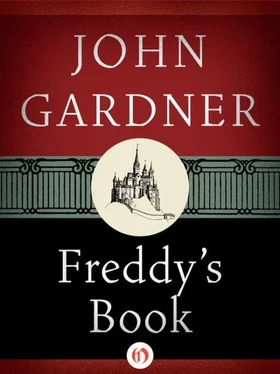Gustav Vasa stared up at him in amazement, prepared to be furious if the thing should prove a trick then abruptly and heartily rose to his feet to shake hands. The firmness of Gustav’s grip made the bishop wince — it looked a little like a sneer of rage to Lars-Goren, but Gustav seemed not to notice. When he had retrieved his hand, the bishop closed it inside the other, as if to keep it from further damage, and changed the sneer to a smile.
“So,” he said, “you made a great impression on the Dalesmen, I understand.”
“I told them what I think,” said Gustav guardedly.
The bishop nodded and moved closer to the fire to look into it and warm his hands. “An interesting speech, by report anyway. You’re quite right, of course. The party of the Stures is finished if it doesn’t find a leader.” He glanced at Gustav, a look simultaneously baffling and direct. Partly, Lars-Goren thought, it was a look of appraisal such as duelists give one another before they fight; but there was more to it than that. Lars-Goren couldn’t make out quite what.
“I realize,” Gustav said, meeting the bishop’s eyes but keeping his voice polite, unassertive, “there are richer and more powerful men than me still living and loyal to the Stures. Yourself, for instance, or the magnate Ture Jönsson. But you’re a bishop, and as for him, with all his holdings in Norway and Denmark—”
Brask waved his hand impatiently, cutting him off. “Yes, yes, all true,” he said. “The miners of Dalarna, Kopparberg, and so on — they’ve never been fond of churchmen or the very rich. You’re the kind of man that appeals to them. One of themselves, more or less.” His lips twitched slightly. He controlled them at once. “Our interests aren’t exactly identical,” he said. “They want a king. That’s not exactly our first priority. But on the other hand, they want a Sture as king; and for our own positions, our little advantages—” He gave a slight wave with his right hand, disparaging the little advantages he enjoyed, the castles and lands he held by favor of the Stures. “We like to see the Sture party reasonably strong. A young man like you, with a gift for persuading the populace and a willingness to do a little fighting if need be …” He bent his head and tapped his chin with one finger. “It would be awkward, of course, if you yourself should decide that you ought to be king.”
Gustav laughed as if nothing could be farther from his mind.
Brask smiled to himself. “By rights, you know, there are people much closer to the throne than you are — if there should have to be a throne.”
“I’m their servant,” Gustav said, and gave a stiff bow, like a farmer.
“Yes, I’m sure,” the bishop said. He turned around to warm his back for a while. Over his shoulder he said, “It’s a tiresome business, isn’t it.”
“Tiresome?” Gustav echoed.
“When I was young,” said the bishop, “I was a great reader of books. They were my chief pleasure — my very life, I would have said.” He shook his head, ironic. “But books are expensive, and you’d be surprised how easily they burn, if the fire gets hot enough. And so one involves oneself in money-grubbing and politics, even war. For the luxury of reading the gentle thoughts of Plato or St. Ambrose, or sharing the pastoral meditations of the Emperor — who turned his back on Rome to run a chicken farm — for the serene pleasure of musing at one’s ease on the glorious illustrations of the Arabs or the masters of Byzantium — one turns one’s whole attention to manipulating fools full of bloodthirst and ambition making them and, when the time comes, breaking them, crushing underfoot all that God and the philosophers have stood for. It’s a tiresome business.”
“I can see that, yes,” said Gustav. He stood looking at the ground, marking it with the side of his foot.
The bishop nodded and for a time seemed lost in thought. His men on their horses sat as still as the trees behind them.
Abruptly, the bishop said, “You’re right about Lübeck. Their money’s the key. Personally, of course, as a Christian bishop sworn to stamp out heresy, I can’t in good conscience have dealings with the Lutherans, though I’m acquainted with a Jew, in a business way. … And you’re right about Dalesmen; there’s the heart of your army — though what they want in the end — taxation of the Church, seizure of Church property, equal say with their betters … Theoretically, in other words, you and I are in quite violent opposition.”
Gustav nodded, slightly smiling.
The bishop’s hand had wandered inside his cloak while he talked. Now, swifter than a striking snake, he drew his sword and slashed at Gustav, aiming straight at his neck. Gustav jerked up his arm to block it — blood rushed down his forearm — and in the same instant he drew his own sword, amazement on his face, and lunged. The bishop lightly sidestepped, released his sword, and threw up both hands. “A test!” he cried, “don’t kill me!” Gustav hesitated, and the bishop lowered his hands. “You’re a quick thinker,” he said, “and you’re clearly no coward.” He smiled. He waved in the direction of his men, and one of them got down from his horse and hurried over to them, bringing liniment and bandages. With a bow almost humble he went to work on Gustav’s arm. Lars-Goren, who had drawn his own sword, slipped it back into its sheath and drew nearer. Meanwhile, the bishop said, “Very well, you shall have your revolution. I’ll support you, have no doubt. Not openly, of course. But then, neither will Lübeck support you openly. It would ruin their chances of wooing Denmark back from the Dutch.”
Gustav gave a cry of pain and raised his fist to hit the man tending him, then thought better of it.
Bishop Brask lifted his sword from the ground where he had dropped it, cleaned the blood off the blade, and put it back in its sheath under his cloak. “Sooner or later, as you know,” he said, “our theoretical opposition will become actual. I’ll be sorry to see that happen. I love grand ideals — eternal friendship, loyalty, all that. In that respect we’re very different, I suspect. Except for a dedication to survival, you have no principles at all. It’s odd that the Devil should have chosen such a man; but then, he’s a fool.” He shrugged.
“For a man of principle,” Gustav said crossly, “you certainly have your little ways.”
“I think you haven’t quite understood me,” said the bishop, “not that it matters, of course; not in the least. You see—” He put on a look so baffled and ironic, above all so extreme in its admission of absurdity — like the expression of a poisoner when he sees that, by carelessness, he’s drunk the wrong wine — that Lars-Goren for an instant felt pity for him. “You see, betrayal of ideals—” He waved vaguely, as if dismissing their pity. “Betrayal of ideals is a great sin and a torment. But what you do, that’s merely savage, merely bestial. Who blames a dog if he eats cow dung? We merely look away in disgust. Dogs will be dogs. But if a man eats dung, and not from madness, which makes him just an animal again, but for some considered purpose not central to his survival but pursuant to his comfort or luxury— then we look away with a vengeance, my friend“—he raised one stern finger—“not in disgust but in scorn!”
“Yes, I see,” Gustav said. If he saw, he was not impressed.
“Perhaps you do, perhaps you don’t,” said the bishop. “It’s not important, of course. You do what’s natural to you, widowing young women, burning down perfectly good buildings. And I, I cunningly support you as long as you’re useful, shifting money and men to your side, providing you with maps and equipment, castles to hide in, information on the enemy’s activities. I have seen to it already that both Dalarna and Kopparberg are armed and equipped, waiting for your command. I will support you, as I say. And then, of course, when you’re no longer useful—” He closed his eyes for a moment and tipped his head up, then opened them, staring into the lead-gray sky. “Such a stupid waste,” he said. “The whole business. I wonder which of us God finds more uninteresting!”
Читать дальше











